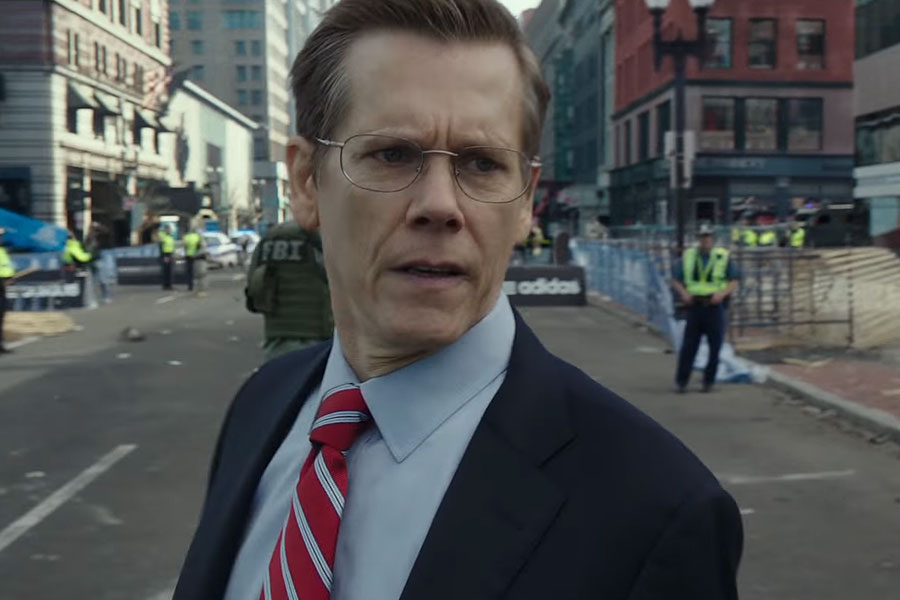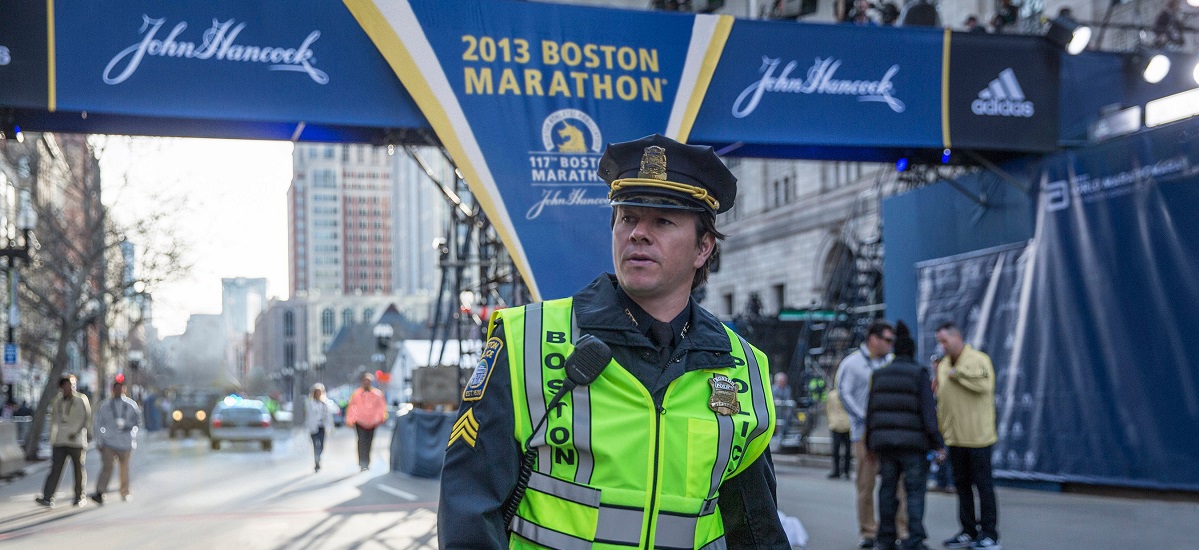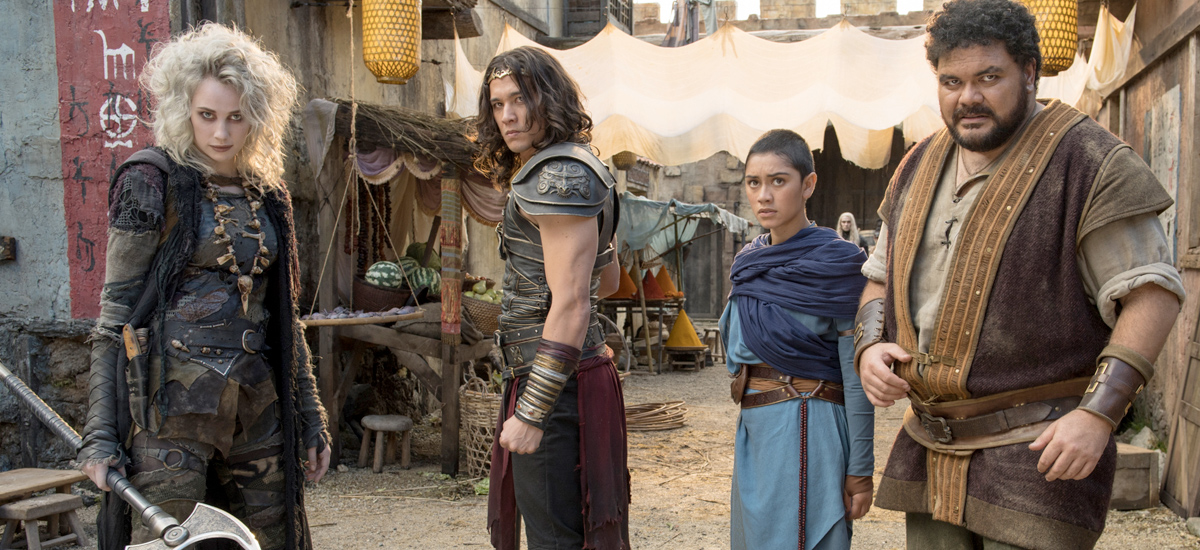The biggest issue one can face, when adapting a true story into a feature film, is to make the characters of the story less interesting or less sympathetic than their real counterparts. Far worse than this is creating a fictional character to be your central focus. Doing so robs most of dramatic heft, as you know they will most likely survive. That Patriots Day commits these sins and more, is a shame, as it hinders an otherwise compelling, and for the most part technically competent retelling of the Boston Marathon bombing of 2013.
Peter Berg has made a small, if not always entirely successful, career recently of making “based on a true story” films. While this would be all fine and good, each entry hews closer to when the events actually occurred. Lone Survivor was made 8 years after the story happened. Deepwater Horizon was released 6 years after. Now comes Patriots Day about 3 1/2 years after that tragic incident. One would almost sadly assume that Berg & company would be gearing up soon to make a film about something that happened just last year. Compare this though to the recently released Hidden Figures, a story that took almost 55 year to get to the screen. Yes, one true story shouldn’t trump another, but a little bit of breathing room helps provide a bit of context, at least regarding the annals of history.
The film follows the 100 or so hours leading up to and following the tragic bombing that happened in April 2013. In the most cloying way possible, the movie allows us a sliver of time with several characters who will be impacted through the course of the coming days. All to maximize the audience’s ability to feel for them. It wants to hammer that these are good innocent home again and again and again. None of these characters are facing any form of turmoil in their day to day lives. They even go so far as to have a father put his son in a stroller and walk down the street, as the camera focuses on a woman wearing a burka further down the block. What may seem out of place, is actually Berg taking a moment to draw his line in the sand, not so subtlety manipulating the audience.

For a large portion of the run time, Patriots Day works smoothly within the confines of a police procedural. It’s also here that the movie reveals itself to have a somewhat diverse cast. A lot of the FBI field agents that are tasked with finding the culprits aren’t your regular white blank faces. Sure they may only have a handful of Asian and African American characters, but they only get a handful of lines, or in the case of Governor Deval Patrick (Michael Beach), a few scenes to look worried and scream. It’s not as if the majority of the actors who aren’t named Mark Wahlberg fare much better though. John Goodman does a Boston accent to play a police commissioner. J.K. Simmons is Sergeant of the Watertown Police, Jeffrey Pugliese and is decent, due to the fact that the world has been conditioned to love Simmons in virtually everything. Kevin Bacon plays Special Agent Richard DesLauriers and is quite good with what he gets to work with, but is forced to the side when the film makes its point that that the Boston Police force should take to the streets and handle proceedings as they see fit.
An area that does get a large amount of screen time is the journey of the Tsarnaev brothers, the men behind the bombing. While Tamerlan (Themo Melikidze) is played as a stock “bad guy”, credit goes to Alex Wolff as Dzhokhar, who turns in a striking performance that is equal parts detachment and confused naivete. Worse served though, is Tamerlan’s wife, Katherine Russell (Melissa Benoist). No one can truly know exactly how complaisant she was concerning events, but the film uses her as a chance to berate someone close to those who carried it out. Her scene with an interregator (Khandi Alexander) will be what divides audiences most, yet is tantamount to the reaction Patriots Day wants to evoke.
Berg makes it clear throughout that not only does he wish to make a straightforward procedural, he also wants to make a “Yay, America!” film in the process. It’s the only logical explanation for some of the weirder, or tonally disconnected moments that occur. He has Dun Meng (Jimmy O. Yang) an Asian entrepreneur, moments after fearing for his life and relaying pertinent information, tell a police officer “Go get those motherf$#@%$#@*”. Another awkward moments sees a female Boston police officer rebuke an FBI officer because he isn’t from Boston and 2 seconds later has her throw out a few extra colorful colloquialisms. Wahlberg himself even leads the charge to empower the local police against the FBI detail as “this is our city”.
Not everything comes off as a wash. From the technical side of things Patriots Day truly sings. Cinematography by Tobias A. Schliessler adds a level of scope to the proceedings, shifting between traditional camera work and what feels like news footage. It feels slightly jarring at times, but manages to hit home the grittiness during the bombing fallout and a prolonged gunfight. Sound mixing also plays a big part, adding a propulsive blast peppered here and there, to what is mostly sedated soundscape.

Time and time again though, events are derailed by Mark Wahlberg, sometimes simply by his mere presence. Superheroes in Marvel movies aren’t at every scene with the regularity that Tommy Saunders is. He may even be a secret superhero with “danger esp”, since he wanders around till he can insert himself into any situation. Early on, the FBI has overtaken a warehouse, not only to set up base of operations, but fully recreate the scene of the crime. DesLauriers enlists Saunders of all people to walk him through where all the security cameras are, on the street of the marathon, as well as those adjacent, in the hopes of ID’ing the suspects. Through pure kismet (or the aforementioned latent superpower) he also appears a few blocks away from a gunfight between Watertown Police and the Tsarnaev brothers, as well as a handful of other conveniently important points in time.
Patriots Day is a film often at odds with itself. It strives to make an accurate retelling of the events surrounding the Boston Marathon bombing, but it wants to tell a human drama as well. To achieve that second half, it betrays the audience, not thinking they’re up to task to truly feel the weight placed upon these individuals. Furthermore, it wishes to undercut these instances with someone to raise “rah-rah, can do” spirit. Stacking all these elements together creates a jumble. It’s a telling trait when something more is naturally felt from the appearance of the real life counterparts characters are based upon, rather than the roles of the actors who portray them. Both the living and departed deserve much much better.



